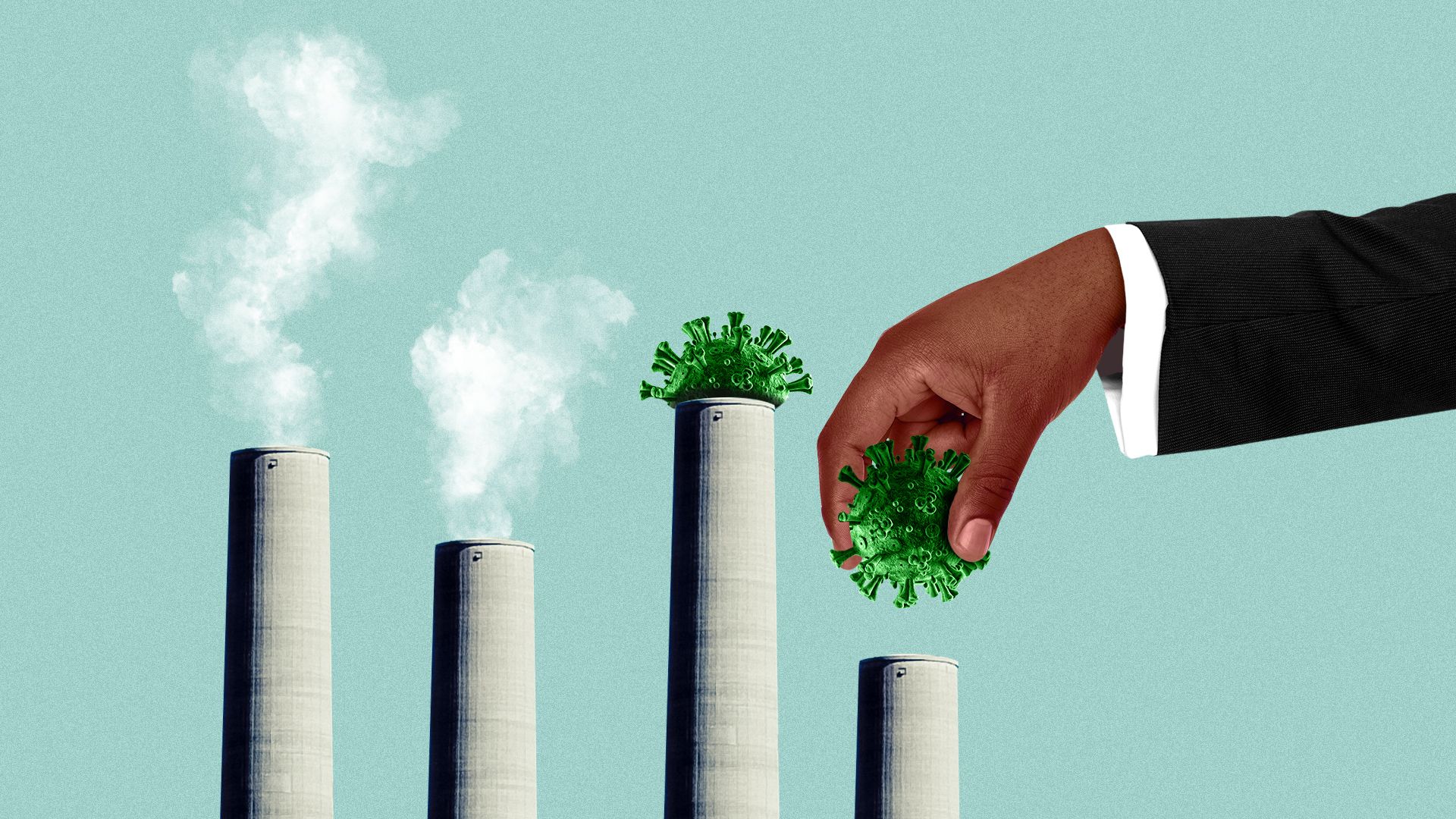https://www.axios.com/10-coronavirus-changes-energy-climate-1cac55b9-8b33-4f7b-afed-ab91f5c75e65.html?fbclid=IwAR3OqBgh3SZQdhS5EbKZvrdKxdrA1G869S99zfgOMn90qcpZU3BrZmPR8l8
Mar 23, 2020 - Energy & Environment
10 ways coronavirus is changing energy and climate change
Illustration: Aïda Amer/Axios
The novel coronavirus, upending our world as we know it, is also changing how we consume energy and address climate change.
Driving the news: The various impacts are occurring both now and into the future. Most changes don’t bode well for acting on climate change and transitioning to cleaner energy.
Five changes happening now:
Lower emissions
Global carbon dioxide emissions are likely to drop this year, due to the global economy faltering. That’s not a silver lining to the novel coronavirus. It’s like a person who loses weight while sick. It’s a byproduct of a bad situation and by definition should and will not last.
Indeed, since the Industrial Revolution, the world’s emissions have not gone down except briefly during economic crises. These incidents merely show how difficult it is to reduce emissions in an economically sustainable way.
Collapsing oil industry
Already struggling with tanking stocks and pressure over climate change, the world’s oil and gas industry is spiraling out of control toward rock-bottom prices. Three factors are converging:
- Abundant supply.
- Demand destruction caused by the coronavirus shutting down major economies.
- A supply and price war between Russia and Saudi Arabia, largely in response to the first two, which pushes prices even lower.
A lot of smaller companies are likely to go bankrupt or substantially shrink, while bigger producers may see more value in their nascent renewables investments.
How it works: Returns in oil have traditionally been better than in renewables. “But there are no returns in oil and gas projects, so what now?" asks Valentina Kretzschmar, corporate research director at consultancy Wood Mackenzie.
Supply and tax troubles for renewable energy
Wind and solar companies are warning about stunted supply chains and tax uncertainty due to borders closing around the world and related economic slowdowns.
Changing energy patterns
All of us working from home will ultimately save energy use in buildings, according to data from Houston-based energy analytics company Innowatts.
By the numbers:
- The company predicts that U.S. daily residential use will increase by 6%–8%.
- Demand from educational and commercial buildings will drop by 30% and 25%, respectively, more than offsetting the growth in home energy use.
Advocacy disrupted
Online grassroots environmentalism isn't going to be as effective as mass gatherings and protests, high-profile campaigner Bill McKibben conceded last week.
Yes, but: Some groups are seeing upsides. Phone2Action, a digital advocacy platform, has seen its usage skyrocket. Its clients include a wide range of organizations and companies, including environmental and energy-industry interests.
- Over the last week, more than 1 million people sent more than 2.3 million messages to Congress.
- In the same period last month, the group had roughly 150,000 people and 290,000 messages to Congress.
Five changes poised to occur over time:
Green lessons
We’re all learning how remote meetings, panels and other events work. To the extent that companies stick with these habits once we’re all able to work and travel like normal again, these changes could have a more lasting impact on our energy use, particularly in transportation.
Recession worries
As the world craters into a recession — one possibly worse than the Great Depression — longer-term problems, including climate change, are likely to go to the back burner. Two signs emerging already:
- China is considering relaxing car-pollution rules in what Bloomberg News described as a possible retreat on climate change.
- The Eurasia Group said last week: "Coronavirus will shift global attention and resources away from addressing climate change.”
Stimulus plans
The International Energy Agency is among the most prominent voices calling on governments around the world to incorporate clean energy into any economic stimulus plans.
- So far that’s not happening, but the renewable energy industry is one of many battered sectors asking Congress for help in any stimulus package the government passes.
- Democrats are also calling on climate-change conditions for any airline bailout.
(Even) less multilateralism
The world was going nationalistic even before the coronavirus hit, and now countries are literally closing their borders and looking inward as they deal with their domestic problems brought on by the coronavirus. That's having an especially strong impact on oil-producing countries.
“It [climate diplomacy] has never been easy. And arguably it has just become more difficult for countries to agree,” said Kretzschmar, of Wood Mackenzie. “Especially for oil-and-gas producing countries that will be hugely affected by this slump in oil prices. Revenues are going to be decimated.”
The election (remember that?)
If Trump wins re-election, any big energy and climate policy remains unlikely. But if Joe Biden, the Democratic front-runner, wins, it seems more likely now than before the coronavirus that he could aim to help the economy similar to the way the Obama administration did after the 2008 economic crash.
“The 2009 Recovery Act was the single most important piece of federal legislation ever to help the clean energy sector,” said Ethan Zindler, head of Americas for BloombergNEF. Clean-energy technologies received some $90 billion in government support.
But, but, but: The economy may be on the mend by then, which feels like a lifetime from now in our current time horizon.


沒有留言:
張貼留言